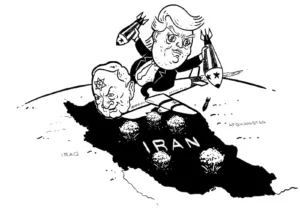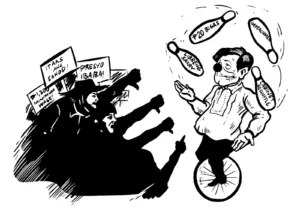Amid tragedies bred by strong typhoons, winds, and rainfall, the Marcos regime infuriatingly continues to push for neoliberal policies that are environmentally destructive and detrimental to the people. On October 17, while many parts of the country were still flooded and another more devastating disaster was looming, the Chamber of Mining of the Philippines, together with Marcos officials, held a conference to intensify destructive mining in the country.
In chorus with mining companies, Marcos is pushing Congress to expedite the passage of a bill amending the mining law. This bill is being pushed under the pretext of increasing taxes in the sector and capitalizing on the demand for “critical minerals” for “sustainable energy” systems in the global market. In truth, its primary goal is to weaken environmental and community regulations to further entice foreign capitalist investment.
The Philippine Mining Act allowed 100% foreign capitalist ownership of mining operations in the country fully opening the Philippines’ resources to plunder as early as 1995. For three decades, giant mining companies from the US, Australia, Canada, Japan, and recently China have been depleting the country’s resources and ravaging its mountains.
Millions of hectares of land and forests have been destroyed, in collusion with local big bourgeois and capitalist bureaucrats. Almost all, or 97%, of the minerals mined are exported for processing and provide no benefit to the local economy. In 2021, the value of minerals exported reached $5.2 billion, mainly copper, gold, and nickel. Despite this, the contribution of mining to local production is less than 1%, and the communities where the largest mines are located remain among the poorest.
In April 2023, Marcos ordered the “simplification” of the process of obtaining mining permits. Among the beneficiaries of this order are Sagittarius Mines, Inc, Philex Mining Corporation, St Augustine Gold & Copper Ltd, RTG Mining, and IDM International—companies facing numerous complaints from environmental defenders, church people, and communities affected by their operations.
Following this, Marcos signed an agreement with the US to further expand nickel mining, a “critical mineral” in the production of batteries for electric vehicles. This mineral is being extracted through open-pit mining, one of the methods most destructive to forests and mountains. The largest of these mines are in Surigao del Norte (Taganito) and Palawan (Rio Tuba), both owned by Nickel Asia Corporation of the Zamora family, and in Sibuyan Island by Altai Mining Philippines Inc, owned by the Gatchalian family. Mining companies were given permits to mine nickel even in protected areas, including watershed areas. The Philippines has long been a major source of nickel (second only to Indonesia) for capitalist countries, and nickel mining has caused many disasters in the country.
It is no surprise that Marcos is aggressively pushing to “revitalize” mining. Many companies involved in opening new mines are owned by the Romualdezes, including his cousin, House Speaker Martin Romualdez. Some of these companies include Benguet Mining Corporation, Bright Kindle Resources, and Marcventures Holdings Inc, all under the RYM Business Management Corporation. These companies have extensive operations throughout the country. Benguet Corporation alone has operations in Benguet, Zambales, Zamboanga del Sur, and Bataan. It also plans to mine 12 coal blocks (equivalent to 12,000 hectares) in the Andap Valley Complex in Mindanao. Marcventures has operations in Leyte and is planning to open a mine in Samar that will cover 10,000 hectares of forest and agricultural land. This is also the company behind the massive Marcopper tragedy in Marinduque in 1993 and 1996.











